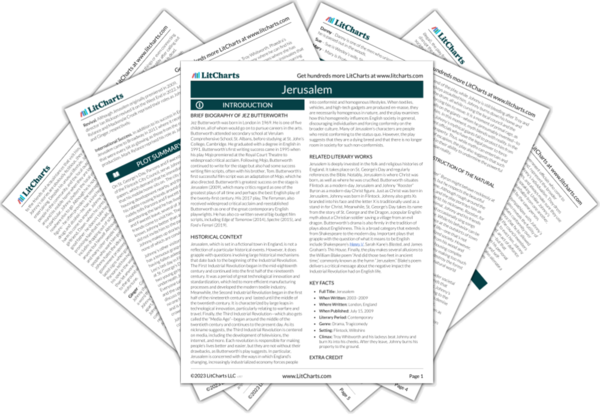Brief Biography of Jez Butterworth
Jez Butterworth was born in London in 1969. He is one of five children, all of whom would go on to pursue careers in the arts. Butterworth attended secondary school at Verulam Comprehensive School, St. Albans, before studying at St. John’s College, Cambridge. He graduated with a degree in English in 1991. Butterworth’s first writing success came in 1995 when his play Mojo premiered at the Royal Court Theatre to widespread critical acclaim. Following Mojo, Butterworth continued to write for the stage but also had some success writing film scripts, often with his brother, Tom. Butterworth’s first successful film script was an adaptation of Mojo, which he also directed. Butterworth’s greatest success on the stage is Jerusalem (2009), which many critics regard as one of the greatest plays of all time and perhaps the best English play of the twenty-first century. His 2017 play, The Ferryman, also received widespread critical acclaim and reestablished Butterworth as one of the great contemporary English playwrights. He has also co-written several big-budget film scripts, including Edge of Tomorrow (2014), Spectre (2015), and Ford v Ferrari (2019).
Historical Context of Jerusalem
Jerusalem, which is set in a fictional town in England, is not a reflection of a particular historical events. However, it does grapple with questions involving large historical mechanisms that date back to the beginning of the Industrial Revolution. The First Industrial Revolution began in the mid-eighteenth century and continued into the first half of the nineteenth century. It was a period of great technological innovation and standardization, which led to more efficient manufacturing processes and developed the modern textile industry. Meanwhile, the Second Industrial Revolution began in the first half of the nineteenth century and lasted until the middle of the twentieth century. It is characterized by large leaps in technological innovation, particularly relating to warfare and travel. Finally, the Third Industrial Revolution—which also gets called the “Media Age”—began around the middle of the twentieth century and continues to the present day. As its nickname suggests, the Third Industrial Revolution is centered on media, including the development of televisions, the internet, and more. Each revolution is responsible for making people’s lives better and easier, but they are not without their drawbacks, as Butterworth’s play suggests. In particular, Jerusalem is concerned with the ways in which England’s changing, increasingly industrialized economy forces people into conformist and homogenous lifestyles. When textiles, vehicles, and high-tech gadgets are produced en-masse, they are necessarily homogenous in nature, and the play examines how this homogeneity influences English society in general, discouraging individualism and forcing conformity on the broader culture. Many of Jerusalem’s characters are people who resist conforming to the status quo. However, the play suggests that they are a dying breed and that there is no longer room in society for such non-conformists.
Other Books Related to Jerusalem
Jerusalem is deeply invested in the folk and religious histories of England. It takes place on St. George’s Day and regularly references the Bible. Notably, Jerusalem is where Christ was born, as well as where he was crucified. Butterworth situates Flintock as a modern-day Jerusalem and Johnny “Rooster” Byron as a modern-day Christ figure. Just as Christ was born in Jerusalem, Johnny was born in Flintock. Johnny also gets Xs branded into his face and the letter X is traditionally used as a stand-in for Christ. Meanwhile, St. George’s Day takes its name from the story of St. George and the Dragon, a popular English myth about a Christian soldier saving a village from an evil dragon. Butterworth’s drama is also firmly in the tradition of plays about Englishness. This is a broad category that extends from Shakespeare to the modern day. Important plays that grapple with the question of what it means to be English include Shakespeare’s
Henry V, Sarah Kane’s
Blasted, and James Graham’s
This House. Finally, the play makes several allusions to the William Blake poem “And did those two feet in ancient time,” commonly known as the hymn “Jerusalem.” Blake’s poem delivers a critical message about the negative impact the Industrial Revolution had on English life.
Key Facts about Jerusalem
-
Full Title: Jerusalem
-
When Written: 2003–2009
-
Where Written: London, England
-
When Published: July 15, 2009
-
Literary Period: Contemporary
-
Genre: Drama, Tragicomedy
-
Setting: Flintock, Wiltshire
-
Climax: Troy Whitworth and his lackeys beat Johnny and burn Xs into his cheeks. After they leave, Johnny burns his property to the ground.
Extra Credit for Jerusalem
